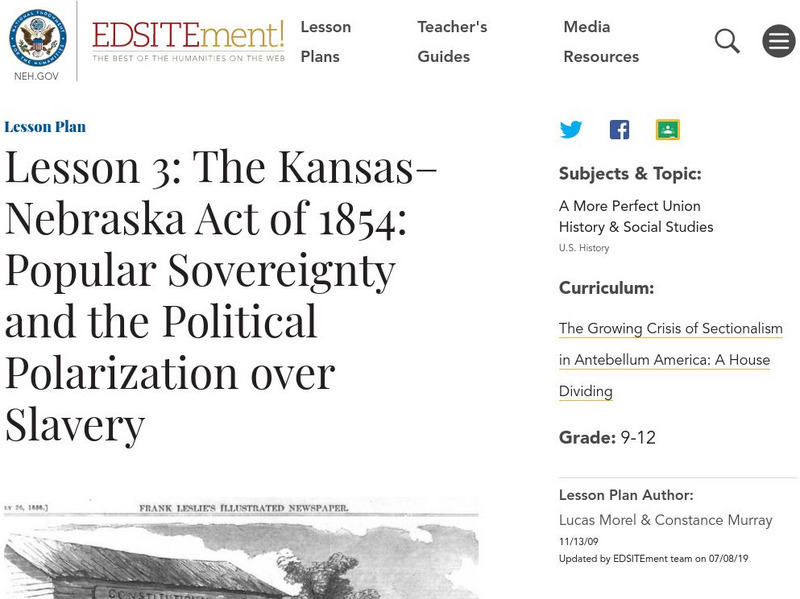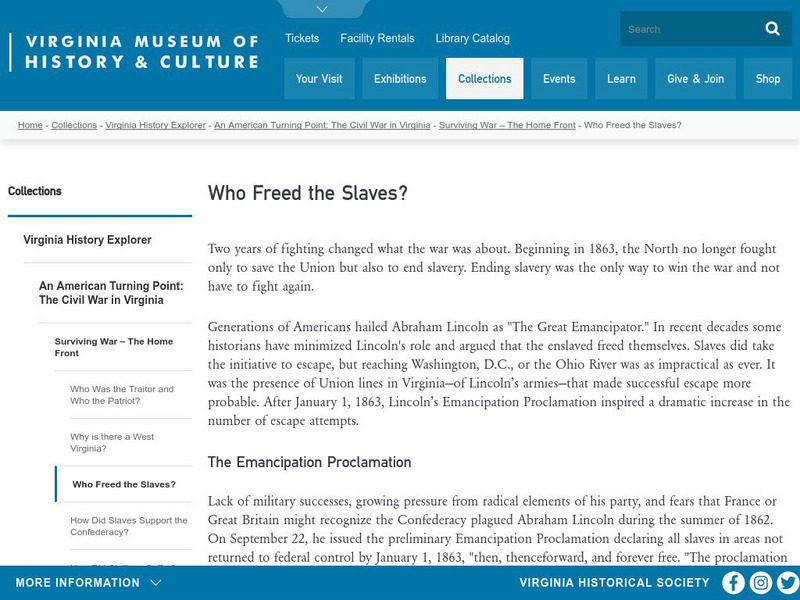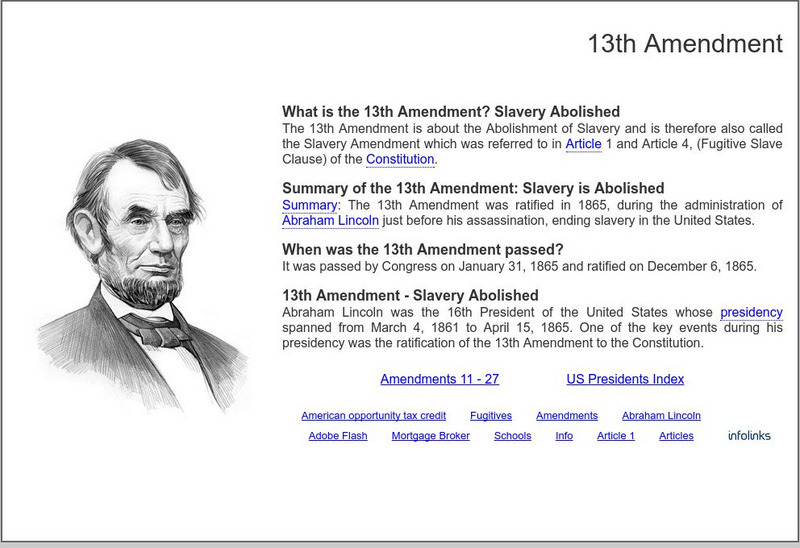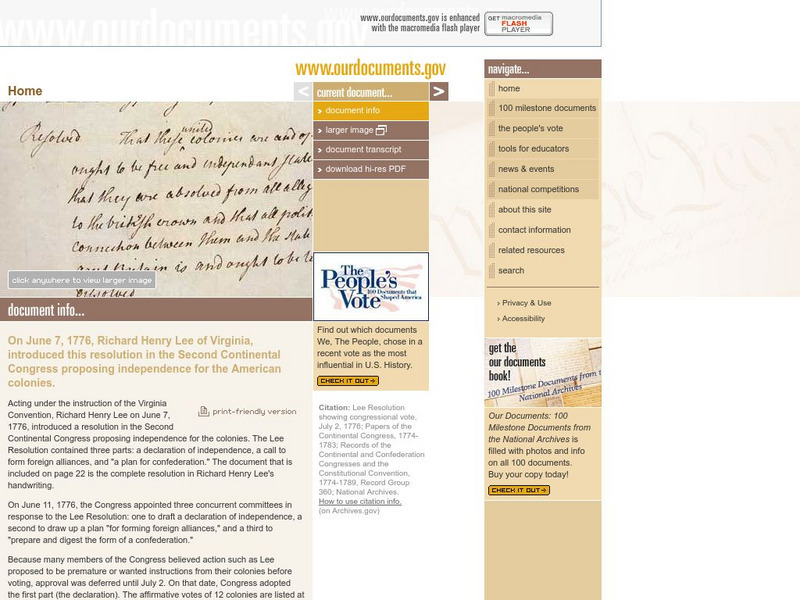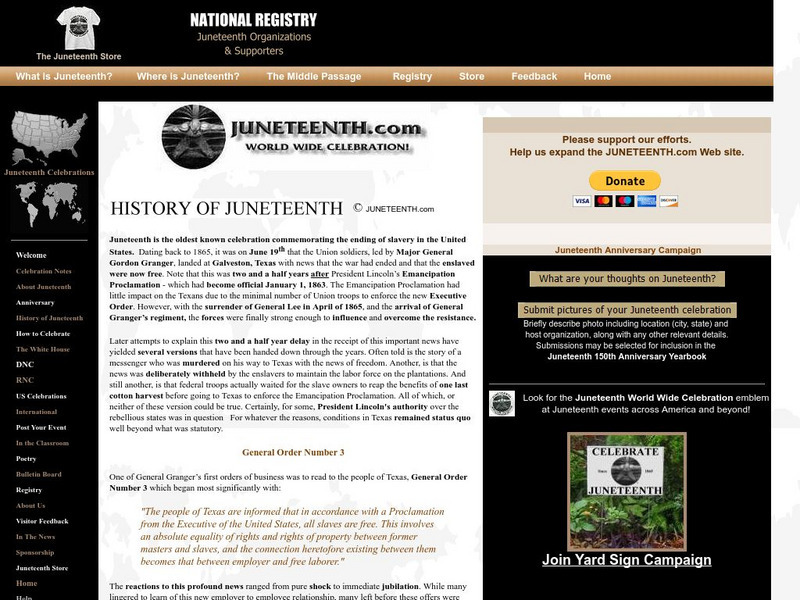Hi, what do you want to do?
Independence Hall Association
U.s. History: The Lincoln Douglas Debates
The Lincoln-Douglas debates in 1858 exemplified the rift in the nation concerning the issue of slavery and who should be able to determine whether states were free or slave. Read about this war of ideas that moved from the stage in...
US Mint
U.s. Mint: One Cent Program: Lincoln 2.0 [Pdf]
In this four-part lesson, learners identify and analyze the challenges that Abe Lincoln faced during his Presidency, including keeping the Union intact.
US National Archives
Our Documents: 13th Amendment to the u.s. Constitution: Abolition of Slavery
Take a look at an image of the constitutional amendment that put an end to slavery in the United States. Interactive image is accompanied by an overview of the amendment's inception and adoption, as well as document transcript.
National Endowment for the Humanities
Neh: Edsit Ement: Lesson3: The Kansas Nebraska Act of 1854: Popular Sovereignty
Lesson plan focuses on the Kansas-Nebraska Act of 1854, popular sovereignty, the political polarization over slavery, Stephen Douglas, and Abraham Lincoln. It provides four detailed activities for use with the lesson and includes...
Other
Southern Illinois History: Homepage
A good reference page, even if it limits itself to Southern Illinois. Good information on slavery in the Land of Lincoln, and the struggle between kidnappers and underground railroad. Site has a search function and plenty of photos.
University of Chicago
Special Collections Library: Stephen A. Douglas and the American Union
Provides information about the Great Debate between Stephen A. Douglas and Abraham Lincoln.
US Department of State
Bureau of International Information Programs: History Outline: Sectionalism
Article reviews several conditions of American society that sowed the seeds of civil war, particularly slavery and sectional conflict.
Huntington Library
Huntington Library: A Nation Conceived in Liberty [Pdf]
In this lesson plan, 11th graders examine the events and political philosophy that laid the foundations of the American government, the Constitution, and the Bill of Rights. They also look at what role religion played in shaping American...
Digital History
Digital History: America's Reconstruction
An overview of Reconstruction provided by the University of Houston. Provides images and the political climate that occurred during this part of American History.
Other
Encyclopedia of American Foreign Policy: Civil War Diplomacy
An article by noted historian, Kinley Brauer, discusses the role of foreign policy for both the North and the South in the Civil War. An interesting, and often forgotten, aspect of the war.
Virginia Historical Society
Virginia Historical Society: The Home Front: Who Freed the Slaves?
Describes how the Emancipation Proclamation of 1863 came into existence, the response from the South, and the impact it had. Three works of art from that period are presented, and the imagery and symbolism explained.
Curated OER
Educational Technology Clearinghouse: Clip Art Etc: Abraham Lincoln
Abraham Lincoln, former United States President, involved in slavery issues and the Civil War.-E. Benjamin Andrews 1895
Khan Academy
Khan Academy: Ap Us History: 1844 1877: The Civil War: Emancipation Proclamation
Discusses the background to the Emancipation Proclamation and how Abraham Lincoln came to support the abolition of slavery and the difficulties that were encountered around this issue. Explains that it did not apply to all slaves as...
CommonLit
Common Lit: "A Nation Divided: North vs. South" by Us history.org
The American Civil War was fought within the United States from 1861 to 1865. The election of President Abraham Lincoln in 1860 increased tension between the North and South. Lincoln's political party was interested in stopping the...
Siteseen
Siteseen: American Historama: Emancipation Proclamation Facts
Provides an overview and ten facts about Abraham Lincoln's Emancipation Proclamation, a war measure freeing the slaves in states still in rebellion against the Union.
Siteseen
Siteseen: Government and Constitution: 13th Amendment
The 13th Amendment was passed by Congress on January 31, 1865, but not ratified until December 6, 1865. This article provides an explanation and summary of the 13th Amendment or Fugitive Slave Clause that abolished slavery.
University of Oklahoma
Chronology of u.s. Historical Documents: The Emancipation Proclamation 1864
Here you can find the full text of the Emancipation Proclamation, issued by Abraham Lincoln in September 1862, and passed into law on January 1, 1863.
Library of Congress
Loc: America's Story: Detective Allan Pinkerton
Allan Pinkerton saved Abraham Lincoln from an assassination attempt, started the United States Secret Service and helped slaves seek freedom via the Underground Railroad. Learn about his early life in Scotland and view a photograph of...
Digital History
Digital History: The Civil War Begins [Pdf]
The election of 1860 showed the deep divisions that split the country. With four candidates representing four very different approaches to the issue of slavery, the outcome resulted in the secession of South Carolina, followed eventually...
Tom Richey
Tom richey.net: The Crisis of the Union (1850 1860) [Ppt]
Presents key ideas for examining the events and issues that led to the American Civil War.
US National Archives
Our Documents: Emancipation Proclamation (1863)
Image of handwritten copy of Lincoln's Emancipation Proclamation, accompanied by an explanation of the speech's purpose, impact, and role in American history.
Other
Juneteenth.com: History of Juneteenth
Juneteenth.com discusses what Juneteenth is, its history, and its celebration. Content includes a look at why June 19, 1865, signifies the end of slavery in America, as opposed to Lincoln's Emancipation Proclamation of January 1, 1863.
CommonLit
Common Lit: "Narrative of the Life of Frederick Douglass" by Fredrick Douglass
Selected (11) reading passages (grades 7-11) to pair with the autobiography "Narrative of the Life of Frederick Douglass" by Fredrick Douglass. Frederick Douglass recounts his experiences as a slave in Maryland, and his treatment at the...
University of Groningen
American History: Outlines: A Divided Nation
This page from the American Revolution Project of the University of Groningen discusses how the 1850s were a time of conflicting ideas between North and South regarding the expansion of slavery. Scroll down to the third paragraph and...





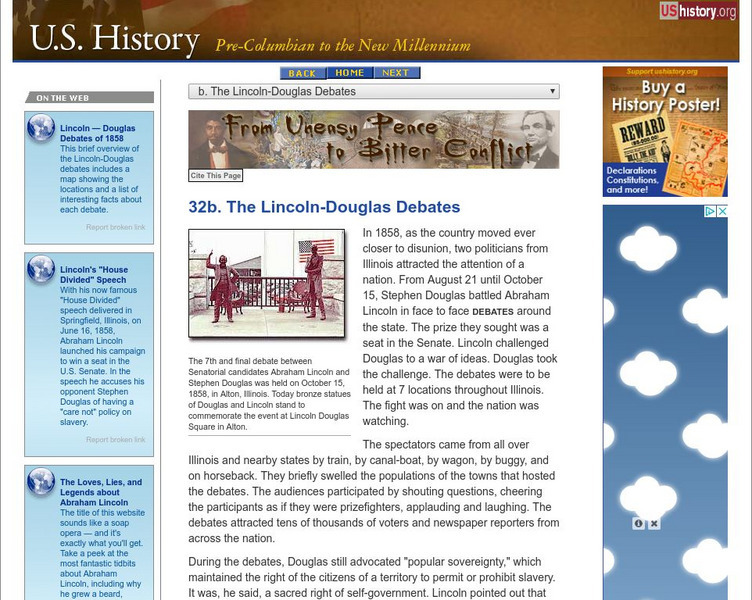
![U.s. Mint: One Cent Program: Lincoln 2.0 [Pdf] Lesson Plan U.s. Mint: One Cent Program: Lincoln 2.0 [Pdf] Lesson Plan](https://static.lp.lexp.cloud/images/attachment_defaults/resource/large/FPO-knovation.png)

